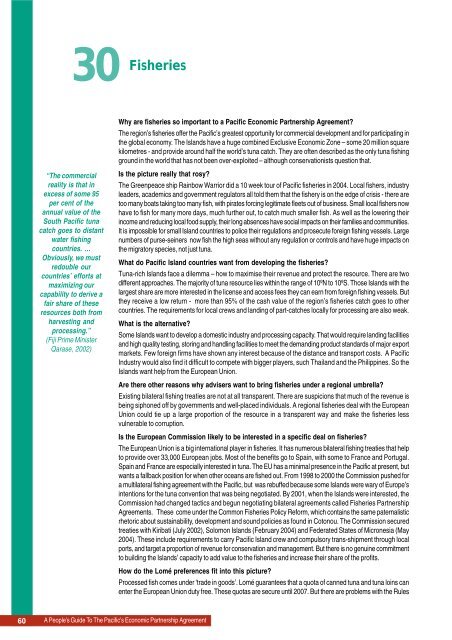REPA Booklet - Stop Epa
REPA Booklet - Stop Epa
REPA Booklet - Stop Epa
Create successful ePaper yourself
Turn your PDF publications into a flip-book with our unique Google optimized e-Paper software.
30 Fisheries<br />
Why are fisheries so important to a Pacific Economic Partnership Agreement?<br />
The region’s fisheries offer the Pacific’s greatest opportunity for commercial development and for participating in<br />
the global economy. The Islands have a huge combined Exclusive Economic Zone – some 20 million square<br />
kilometres - and provide around half the world’s tuna catch. They are often described as the only tuna fishing<br />
ground in the world that has not been over-exploited – although conservationists question that.<br />
“The commercial<br />
reality is that in<br />
excess of some 95<br />
per cent of the<br />
annual value of the<br />
South Pacific tuna<br />
catch goes to distant<br />
water fishing<br />
countries. …<br />
Obviously, we must<br />
redouble our<br />
countries’ efforts at<br />
maximizing our<br />
capability to derive a<br />
fair share of these<br />
resources both from<br />
harvesting and<br />
processing.”<br />
(Fiji Prime Minister<br />
Qarase, 2002)<br />
Is the picture really that rosy?<br />
The Greenpeace ship Rainbow Warrior did a 10 week tour of Pacific fisheries in 2004. Local fishers, industry<br />
leaders, academics and government regulators all told them that the fishery is on the edge of crisis - there are<br />
too many boats taking too many fish, with pirates forcing legitimate fleets out of business. Small local fishers now<br />
have to fish for many more days, much further out, to catch much smaller fish. As well as the lowering their<br />
income and reducing local food supply, their long absences have social impacts on their families and communities.<br />
It is impossible for small Island countries to police their regulations and prosecute foreign fishing vessels. Large<br />
numbers of purse-seiners now fish the high seas without any regulation or controls and have huge impacts on<br />
the migratory species, not just tuna.<br />
What do Pacific Island countries want from developing the fisheries?<br />
Tuna-rich Islands face a dilemma – how to maximise their revenue and protect the resource. There are two<br />
different approaches. The majority of tuna resource lies within the range of 10ºN to 10ºS. Those Islands with the<br />
largest share are more interested in the license and access fees they can earn from foreign fishing vessels. But<br />
they receive a low return - more than 95% of the cash value of the region’s fisheries catch goes to other<br />
countries. The requirements for local crews and landing of part-catches locally for processing are also weak.<br />
What is the alternative?<br />
Some Islands want to develop a domestic industry and processing capacity. That would require landing facilities<br />
and high quality testing, storing and handling facilities to meet the demanding product standards of major export<br />
markets. Few foreign firms have shown any interest because of the distance and transport costs. A Pacific<br />
Industry would also find it difficult to compete with bigger players, such Thailand and the Philippines. So the<br />
Islands want help from the European Union.<br />
Are there other reasons why advisers want to bring fisheries under a regional umbrella?<br />
Existing bilateral fishing treaties are not at all transparent. There are suspicions that much of the revenue is<br />
being siphoned off by governments and well-placed individuals. A regional fisheries deal with the European<br />
Union could tie up a large proportion of the resource in a transparent way and make the fisheries less<br />
vulnerable to corruption.<br />
Is the European Commission likely to be interested in a specific deal on fisheries?<br />
The European Union is a big international player in fisheries. It has numerous bilateral fishing treaties that help<br />
to provide over 33,000 European jobs. Most of the benefits go to Spain, with some to France and Portugal.<br />
Spain and France are especially interested in tuna. The EU has a minimal presence in the Pacific at present, but<br />
wants a fallback position for when other oceans are fished out. From 1998 to 2000 the Commission pushed for<br />
a multilateral fishing agreement with the Pacific, but was rebuffed because some Islands were wary of Europe’s<br />
intentions for the tuna convention that was being negotiated. By 2001, when the Islands were interested, the<br />
Commission had changed tactics and begun negotiating bilateral agreements called Fisheries Partnership<br />
Agreements. These come under the Common Fisheries Policy Reform, which contains the same paternalistic<br />
rhetoric about sustainability, development and sound policies as found in Cotonou. The Commission secured<br />
treaties with Kiribati (July 2002), Solomon Islands (February 2004) and Federated States of Micronesia (May<br />
2004). These include requirements to carry Pacific Island crew and compulsory trans-shipment through local<br />
ports, and target a proportion of revenue for conservation and management. But there is no genuine commitment<br />
to building the Islands’ capacity to add value to the fisheries and increase their share of the profits.<br />
How do the Lomé preferences fit into this picture?<br />
Processed fish comes under ‘trade in goods’. Lomé guarantees that a quota of canned tuna and tuna loins can<br />
enter the European Union duty free. These quotas are secure until 2007. But there are problems with the Rules<br />
60<br />
A People’s Guide To The Pacific’s Economic Partnership Agreement
















